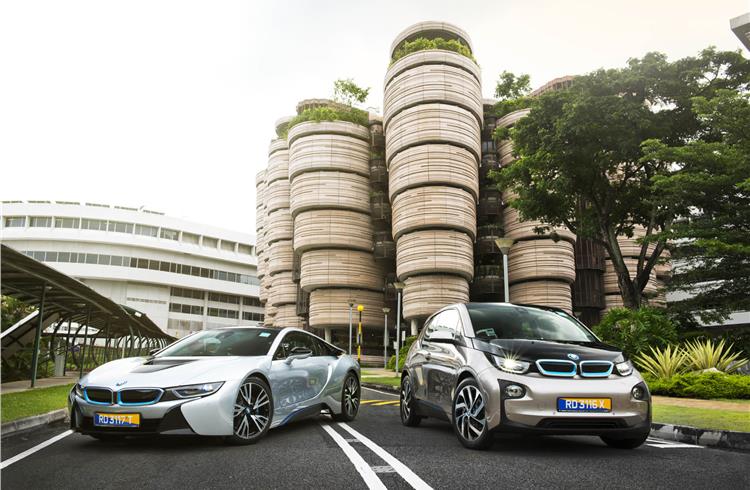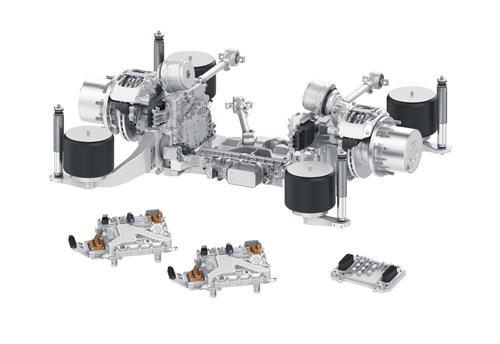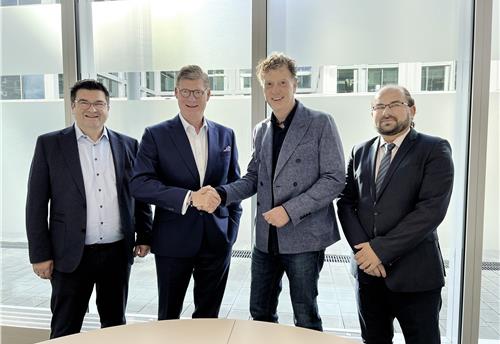BMW and Singapore’s NTU embark on electromobility research
BMW Group and Nanyang Technological University have launched a new electromobility research programme, involving the all-electric BMW i3 and plug-in hybrid sports car BMW i8.
BMW Group and Nanyang Technological University (NTU Singapore) today launched a new electromobility research programme, involving the all-electric BMW i3 and plug-in hybrid sports car BMW i8 that runs on electricity and petrol.
This new research programme will be conducted at the Future Mobility Research Lab located on the NTU campus, which is the BMW Group’s first joint lab in Southeast Asia. Both parties will be injecting a combined S$1.3 million to drive the new research projects, on top of the initial S$5.5 million funding allocated to the joint lab in 2013.
The new research programme will focus on two new areas – Electromobility in Asia and also Smart Materials. This is in addition to the original three research topics that the joint lab is working on: Advanced Battery, Driver Enhancement and Intelligent Mobility.
The scientists at the joint lab will use the two BMW i vehicles to conduct research on real-life driver behaviour and to collect in-depth data on vehicle performance. The two cars will also conduct on-road trials of new technologies such as a mobile application that can accurately predict traffic and estimated end-to-end travelling time.
Axel Pannes, managing director of BMW Group Asia, said: “We are very satisfied with our partnership with NTU and the establishment of the Future Mobility Research Lab, thanks to the high level of competency from NTU’s research staff and interdisciplinary teams.”
“Through the relentless efforts of the dedicated researchers, we have already made some important findings through the earlier research topics in a short period of just two years. With the expanded research scope on Electromobility in Asia and Smart Materials, more invaluable knowledge will be gained by both parties. Further, the knowledge will also be transferred to Singapore’s academia and broaden their technical understanding of modern full-electric and plug-in hybrid electric vehicles. It will definitely forge a stronger technological partnership between the BMW Group and NTU,” added Mr. Pannes.
Professor Lam Khin Yong, NTU’s chief of staff and vice-president (Research), said the new research programme will build on the research successes of the NTU-BMW joint lab.
“The new research programme will further exploit the synergy between BMW Group’s leadership and expertise in automotive sciences and NTU’s leading research in sustainability and clean technologies. The NTU-BMW joint lab has already made important advancements in areas such as new battery materials that can extend the range of an electric vehicle and innovative driver assistive technologies to greatly enhance safety.”
Tan Kong Hwee, Director, Transport Engineering, Singapore Economic Development Board, said: “BMW's partnership with NTU for the set-up of its Future Mobility Lab is testament to the increasing interest in urban mobility and Singapore’s attractiveness for the conduct of research and development in this area.”
Electromobility in Asia
The main goal of embarking on the Electromobility in Asia project is to find out how drivers interact with BMW i vehicles in real life, so as to better understand user behaviours and to improve electric and plug-in hybrid technology for the future.
By conducting the research in Singapore, a densely-populated, urban city state, it will enable researchers in the joint lab to gain insights on how electric vehicles can be made more relevant for global megacities. Other study topics include how emerging technologies like fast charging, wireless charging and smart assistant driving technologies will impact the consumer.
Smart Materials
With today’s proliferation of touchscreen interfaces being used increasingly in vehicles, there is a need to study how these touchscreen surfaces can be made more tactile.
Through research in various shape memory materials and dielectric polymers, scientists will look at developing technologies which can enable buttons to appear on interactive surfaces and touch screens when needed.
Mr Pannes added that Singapore is the perfect venue for the BMW Group to conduct research on electromobility. “In Singapore, the second most densely populated country in the world, we anticipate that electric vehicles with its zero tailpipe emissions and exhaust fumes will be a key player in the transportation network of the future. The city-state also has high connectivity and a tech-savvy population, which makes it more receptive towards new cutting-edge technology. Further, we believe Singapore has the potential to become a R&D hub for electromobility, especially with its clearly expressed ambitions to become a Smart Nation. We want to play a contributive role in that.”
Future Mobility Research Lab breakthroughs
The Future Mobility Research Lab, set up in April 2013, aims to research and develop key areas relating to future transportation, which includes Advanced Battery, Driver Enhancement, and Intelligent Mobility.
After two years of intensive research, the Future Mobility Research Lab has made some significant findings in the following areas:
Advanced Battery: New battery materials are being experimented on, such as high-voltage cathodes and anodes (the positive and negative poles of a battery), which can potentially double the energy density, which is important in extending the range of an electric car as well as enable faster charging times.
Driver Enhancement: Current sensor technologies are able to tell if a driver is sleepy or alert and if the vehicle is on a collision course with another vehicle, based on the speed and direction it is travelling. However, the sensor systems are independent of each other, and does not take into account the driver’s present condition and adjust to it.
A driver enhancement system is now being developed to adapt to the driver’s condition, to either increase or decrease the number of assistance technologies deployed to help the driver. It is based on parameters such as whether the driver is alert or sleepy, if he/she is paying attention to the road, and if traffic conditions around the vehicle is congested or sparse.
Intelligent Mobility: A mobile application has been developed which can better predict the traffic conditions and accurately estimate arrival time at the destination. This app is based on an intelligent routing system that calculates individual driving style and current traffic situation based on real-time traffic information. It also has a parking search system that analyses the parking situation around the destination.
RELATED ARTICLES
Lamborghini unveils Urus SE ahead of Auto China 2024
Electric-only range of 60km helps reduce emissions by 80%.
ZF to display next-gen e-axle for low-floor city buses at Busworld Turkiye 2024
The AxTrax 2 LF is available with a continuous output of up to 360 kW and a peak torque of up to 37,300 Nm.
Daimler Buses and BMZ Poland to develop next-gen NMC4 electric bus batteries
The new battery generation NMC4 – succeeding the current NMC3 technology – will combine high energy density, resulting i...





 By Autocar Pro News Desk
By Autocar Pro News Desk
 30 Jun 2015
30 Jun 2015
 3110 Views
3110 Views









